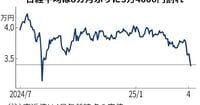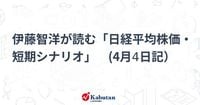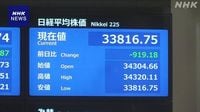The Tokyo stock market experienced significant turmoil on April 4, 2025, as the Nikkei Stock Average plummeted by over 900 yen, dropping below the critical 34,000 yen mark for the first time in about eight months. This decline was largely fueled by heightened concerns regarding potential economic repercussions from mutual tariffs proposed by former U.S. President Donald Trump, affecting approximately 60 countries, including Japan.
Trading commenced at 9 AM local time, and the sentiment was palpable as investors reacted to the news of the tariffs, which are expected to impact corporate performance across various sectors. The Nikkei index, which had closed at 34,735.93 yen the previous day, saw its value dip significantly, fluctuating around the 33,800 yen level during trading hours.
Market analysts noted that the sell-off was particularly pronounced in the automotive sector, with major companies facing increased selling pressure. For instance, Tokyo Electron saw its shares temporarily decrease by 5%, while Mitsubishi UFJ Financial Group experienced a staggering 11% drop, marking its lowest point since November 2024. Approximately 90% of the issues on the Tokyo Stock Exchange Prime Market were reported to be declining, indicating a widespread lack of confidence among investors.
As the day progressed, the financial markets in Europe and the United States had already shown signs of instability on April 3, 2025, with stocks falling in response to fears surrounding the potential global economic slowdown driven by the tariffs. Market participants were left grappling with uncertainty, as they questioned the extent and impact of these tariffs on the broader economy.
T&D Asset Management's Chief Strategist, Hiroshi Namioka, commented on the situation, stating, "Investors are reacting sensitively to the risk of a global economic downturn, leading to a shift towards selling stocks and buying bonds." This sentiment was echoed by various analysts who pointed out that the chain reaction of stock declines could further exacerbate market volatility.
In the bond market, the yield on newly issued 10-year government bonds dropped to 1.230%, the lowest level in approximately two months, reflecting a flight to safety among investors. This decline in yields suggests that the Bank of Japan may find it challenging to implement further interest rate hikes in the current economic climate.
Meanwhile, in the foreign exchange market, the yen showed signs of strength against the dollar, trading in the mid-145 yen to early 146 yen range. This shift was attributed to the growing concerns over the U.S. economy, prompting a sell-off of the dollar against major currencies, including the yen and euro. Chief Market Strategist Akira Moroga from Aozora Bank noted that if stock prices continue to decline, the yen could strengthen further, potentially pushing it to new highs against the dollar.
As the situation develops, investors are left to ponder whether the recent sell-off represents a buying opportunity or a precursor to more significant declines. The market's reaction to the tariffs and the overall economic outlook will be closely monitored in the coming days.
With the specter of global economic repercussions looming large, the Tokyo stock market remains on edge. The uncertainty surrounding the mutual tariffs has created a ripple effect, impacting not just Japan but the global economy at large. Market participants are keenly aware of the potential for further volatility as they navigate these turbulent waters.
As the trading day concluded, the Nikkei's temporary drop below 34,000 yen marked a critical moment in the market's trajectory, raising questions about the future direction of stock prices and the overall health of the economy. Analysts and investors alike will be watching closely for any signs of recovery or further decline in the days ahead.







